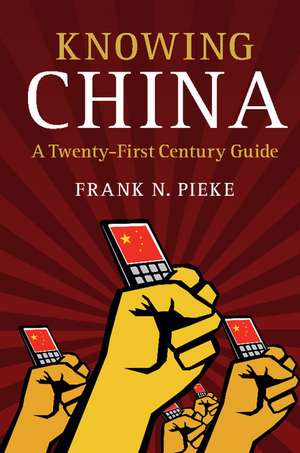Knowing China: A Twenty-First Century Guide
Autor Frank N. Piekeen Limba Engleză Paperback – 27 iul 2016
Preț: 148.05 lei
Nou
Puncte Express: 222
Preț estimativ în valută:
28.33€ • 29.47$ • 23.39£
28.33€ • 29.47$ • 23.39£
Carte disponibilă
Livrare economică 24 martie-07 aprilie
Preluare comenzi: 021 569.72.76
Specificații
ISBN-13: 9781107587618
ISBN-10: 1107587611
Pagini: 234
Dimensiuni: 153 x 231 x 14 mm
Greutate: 0.34 kg
Editura: Cambridge University Press
Colecția Cambridge University Press
Locul publicării:New York, United States
ISBN-10: 1107587611
Pagini: 234
Dimensiuni: 153 x 231 x 14 mm
Greutate: 0.34 kg
Editura: Cambridge University Press
Colecția Cambridge University Press
Locul publicării:New York, United States
Cuprins
1. Introduction: knowing China; 2. Why the Communist Party will not fall from power; 3. China's economy will continue to grow, but not forever; 4. Freedom without universal human rights; 5. From empire to nation, or why Taiwan, Tibet and Xinjiang will not be independent; 6. Not just a Chinese century; 7. Conclusion: the Communist Party and China's future; References; Index.
Recenzii
'In an extraordinary double act, Frank Pieke reaches out to the China non-specialist and specialist alike. He provides the former with the most digestible account to date of China's unconventional ascendancy and forces China experts out of their academic enclaves into public world debate. His concept of neo-socialism makes sense of China's intriguing socio-cultural and politico-economic twists and turns that draw on its civilized past and aspirations and defy conventional Western analytical categories.' David Parkin, All Souls College, Univeristy of Oxford
'Engagingly written, the work reflects an impressive knowledge and understanding of contemporary China … Highly recommended. Upper-division undergraduates through faculty.' J. A. Rhodes, Choice
'Pieke's argument draws on an understanding of China's premodern culture, with the 'mandate of heaven' - a kind of legitimacy gained by virtue of rulers' ability to create prosperity - now in the hands of the CCP. He paints a fascinating, counterintuitive picture of the CCP as a quasi-theological institution, and certainly one that has no intention of using the tactics familiar to liberal societies to reform.' Project Syndicate (www.project-syndicate.org)
'I find this book very interesting and well written. Its innovative concept of neo-socialism is very useful to capture the distinctiveness of contemporary China, which consists of an uneasy combination of different contradictory elements that defies any easy characterization. In addition, this book is very informative because Pieke has done an excellent job in synthesizing the findings in Chinese studies to answer such research questions as: why the communist party will not fall from power, why Chine's economy will continue to grow, but not forever, and why Chinese people have freedom without universal human rights. This, both general readers and area specialists will find this book indispensable for their in-depth understanding of contemporary China.' Alvin Y. So, Pacific Affairs
'Engagingly written, the work reflects an impressive knowledge and understanding of contemporary China … Highly recommended. Upper-division undergraduates through faculty.' J. A. Rhodes, Choice
'Pieke's argument draws on an understanding of China's premodern culture, with the 'mandate of heaven' - a kind of legitimacy gained by virtue of rulers' ability to create prosperity - now in the hands of the CCP. He paints a fascinating, counterintuitive picture of the CCP as a quasi-theological institution, and certainly one that has no intention of using the tactics familiar to liberal societies to reform.' Project Syndicate (www.project-syndicate.org)
'I find this book very interesting and well written. Its innovative concept of neo-socialism is very useful to capture the distinctiveness of contemporary China, which consists of an uneasy combination of different contradictory elements that defies any easy characterization. In addition, this book is very informative because Pieke has done an excellent job in synthesizing the findings in Chinese studies to answer such research questions as: why the communist party will not fall from power, why Chine's economy will continue to grow, but not forever, and why Chinese people have freedom without universal human rights. This, both general readers and area specialists will find this book indispensable for their in-depth understanding of contemporary China.' Alvin Y. So, Pacific Affairs
Notă biografică
Descriere
A new examination of the many contradictions of contemporary China, a society at once capitalist and socialist, free and authoritarian.










